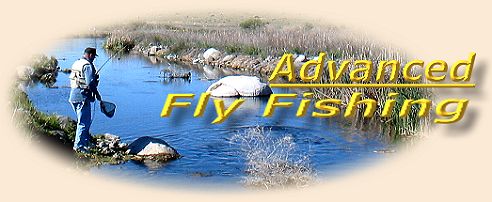|
"Ya can see a lot of things by observing."
Love that one and it's true in more than
one way. Let me try to explain. Part of
what advanced fly fishing is, if there is
such a thing, might be learning to see things
and being aware of how they may all tie together.
Seeing is just with the eyes, Observing brings
all the senses to bare and sometimes for
seemingly no apparent reason we do a certain
thing. Wee may call it instinct, perhaps a
hunch, maybe intuition. Whatever, the name
does not much matter. What is important is this.
To make the best and most intelligent
decisions, whether in life or fly fishing,
we need as many facts as possible. Knowing
what they are, where to look for them and
how to recognize them when we find them all
go together to produce a decision which will
probably be better than flipping a coin.
For instance, when you are fishing a dry fly
upstream on a nice meadow brook to a rising
trout. Would it matter what time of day it was
as to where you put your fly? It could. Would
the color of a wet fly show better in one place
over another? Or at some other time of day? Would
color matter at all? Mostly, does it ever? Do you
think of these things when you are fishing?
If the trout takes your fly, you're probably
not too concerned. But if he just dashes up and
refuses it at the last minute, then what? Or it
drifts by him time and time again, and he won't
raise a fin to even look at it, then what? Is it
your presentation, your leader size, tippet size,
or it is floating or sinking, or is it the fly
and how it looks at that time of day. Ever been
casting with poor results and then just before
dark, the 'bite' came one? Come on, bite?
Something changed. Did you notice what it was?
Well, the amount of light changed for one thing.
Anything else?
Whatever changed, could you control it, could
you have produced the effect earlier in the
day? Were you doing something wrong during the
day? When your fly is between the sunlight and
the fish does he only see a silhouette? Do an
Adams and a Royal Coachman look the same then?
What if you place your fly on the other side
of the trout, could you have been missing him
by inches? Perhaps. Were you thinking about
these things when not all was going right?
Will you in the future?
If you have the wrong fly but it's in silhouette,
are you better off if the fish can't see the
color? Under what circumstances do fish take
a fly by it's shape and not the color, by it's
size? How about the way it acts on the water,
or whether it rides high or sinks a bit into
the surface?
Should your leader sink of float? If it
floats, will it make a shadow, and if so,
so what? If It sinks, will it scare the
fish or will they simply ignore it? Will
it sparkle in the bright sunlight and
spook them? You don't know for sure do
you? Being aware of these can make a
difference in how well you do. Some guys
do these things almost subconsciously,
but only after spending some time of
working on them. There are others too,
little things that seem to qualify as
advanced fly fishing, things that should
only be considered after you have learned
the basics, then added and combined them
into a lifetime of fly fishing.
Let me conclude with perhaps the most
important time of absorption of all. I
know this has happened to you. It has
to have. Think about the various times
you have approached a place on a stream
to fish. A place you know and have fished
more than once. You near the stream and
notice a person already fishing, he is
younger than you. If you had found a
person sitting on the bank just resting,
he would have been older than you. Why is
that?
The younger the fisher the less patience
he has and must enter the water at a dead
run. The older gentleman will hold up on
land and observe. He will take in all he
can with as many senses he has left working.
Perhaps eyesight or hearing may not be quite
what they had once been, but when combined
with all his senses and abilities he can be
a formidable opponent. His world likely
contains more than yours, at least for now.
He has learned over the years to look, really
look, and not just with his eyes. Observation
combined with knowledge can produce wisdom.
Every time. ~ JC
|

